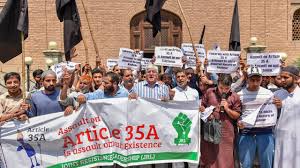With two major political parties of Jammu and Kashmir — National Conference (NC) and Peoples Democratic Party (PDP) — announcing a boycott of the upcoming panchayat and Urban Local Body elections, the message being sent out is that the situation in Kashmir has slipped into chaos. Moreover, the political instability will be exacerbated as the militancy has already grown deep roots among the general masses.
The reason given by both the parties is the ongoing court case over the possible revocation of Article 35A, which gives special status to the state subjects. But taking a look at developments in the region, the main reason is that the space for mainstream politics, especially in the Valley, has eroded since the 2016 civilian uprising. For the PDP, which was in power with the Bharatiya Janata Party (BJP) till last June, its very own bastion of South Kashmir has turned into its main opposition.
In the past two years, mainstream political leaders and activists have not been able to visit the South, with many of them not even visiting their homes. During the PDP-BJP rule, over 300 civilians and more than 450 militants were killed, and “Operation All Out” was also launched last year. The coalition government couldn’t even hold the Lok Sabha elections for its vacant Anantnag seat, where the PDP created an example of nepotism by fielding Tassaduq Mufti, brother of the then chief minister Mehbooba Mufti. These are the blots on the political fabric of the PDP, which used to take pride in its support from the South.
For mainstream parties in general, their once vote banks are now oppositions — not just that, but protesters. It is this change in the past two years that has led both parties to boycott elections, follow the Hurriyat policy, and prove mainstream politics has lost the war in Kashmir.
Boycotting elections over Article 35A
On 5 September, 2018, the National Conference vice-president and former chief minister, Omar Abdullah said that the Centre was using the upcoming elections as a tactic to delay the proceedings in the court over Article 35A. “It is now for the Central government to clarify where it stands with regard to Article 35A. It’s not enough to use panchayat and municipal elections simply to delay proceedings in court,” Abdullah had tweeted.
However, on the ground, the political picture indicates an entirely different reality. Even if the NC cited Article 35A as the reason for boycott, the truth is for political parties across ideologies, there is a very limited space left for propagating the idea of “Jammu and Kashmir as an integral part of India”, which they have always guarded and strengthened.
Following up on their rivals, the PDP a few days later passed a resolution, deciding to stay away from the elections. It wasn’t surprising for anyone as the PDP has lost its ground heavily. It will take them time and rigorous policy shift to get back to normality on their own scale.
Even though on paper the party gave Article 35A as the primary reason for boycotting the polls but from the “atmosphere of fear” that the PDP has referred to, it is clear that it is actually the fear of losing the polls is what the party is truly worried about. It is the response they got after being thrown out of the coalition government by the BJP that has shaken the party’s confidence. People are not only angry but they want revenge against the party for being in power when people were either being killed or blinded. The PDP, while in power, only proved they want to be in power at the cost of people’s lives. The party’s approach was quite similar to what the NC had done in the late 90s.
When the armed militancy was at its peak, but slowly getting weaker by infighting and alleged human rights violations by the troops in mid-90s, it was Farooq Abdullah who was brought back to active politics. The idea was to make NC fight 1996 elections and get back the control. The main force that brought Farooq back as chief minister was Ikhwaan or counter-insurgents – he even rewarded some by making them members of the Assembly.
The return of Farooq, with the bloodied help of Ikhwaan, costed lives of pro-freedom people. Today, Kashmir is back almost at the same square where elections are a strategy to get back lost control and space in the Valley. If Omar had Ikhwaan he may not have called for the boycott or even if PDP had some backdoor help (like in 2002) they may have too not boycotted. But the situation has changed to an extent where none of the wildcards is left anymore.
A Jammu and Kashmir Police report last August revealed that 327 militants are active, among which 211 are locals and 116 are foreigners. The report noted that 166 local militants are active in four districts of South Kashmir only.
There is no doubt about the changing situation in the Valley as one gets a sense clearly from the recent abduction of relatives of policemen in southern districts, which resulted in the transfer of Director General of Police SP Vaid. For political workers, the sense of urgency has been lost and parties can hardly go to campaign today. This scenario has developed two things: one that the mainstream politics has been brought to a halt and that the situation will likely go from bad to worse if the elections are held.




